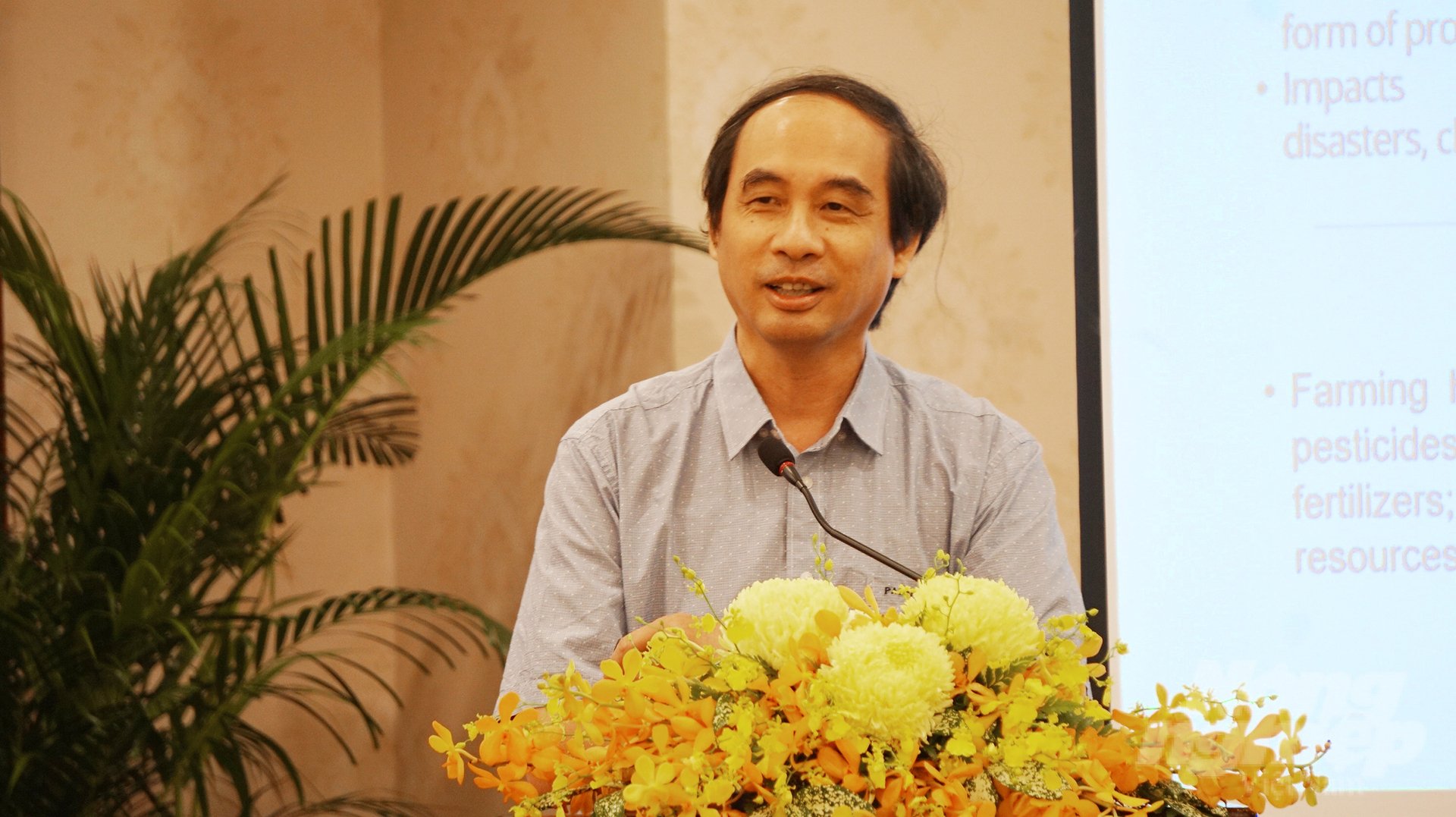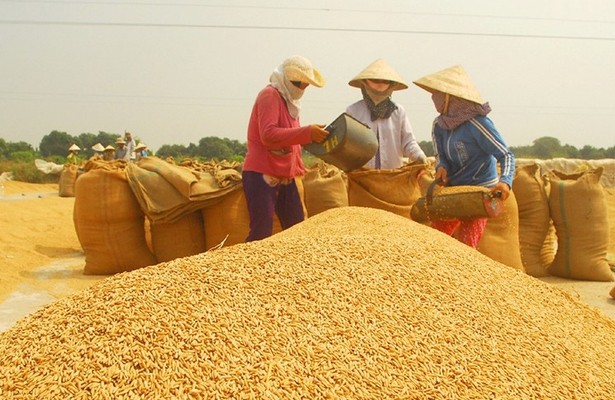May 24, 2025 | 16:23 GMT +7
May 24, 2025 | 16:23 GMT +7
Hotline: 0913.378.918
May 24, 2025 | 16:23 GMT +7
Hotline: 0913.378.918

Assoc. Prof. Dr. Dao The Anh, Deputy Director of the Vietnam Academy of Agricultural Sciences (VAAS). Photo: Nguyen Thuy.
In an interview with the Vietnam Agriculture Newspaper on the sidelines of the seminar on "Vietnam and food security", Dr. Dao The Anh, Deputy Director of the Vietnam Academy of Agricultural Sciences offered an in-depth view into food security. The concept of food security, according to FAO, encompasses concerns regarding food product quality, food safety, and nutrition security in addition to prior concerns regarding sufficient food sources.
"The Vietnamese government has acknowledged this global challenge and issued multiple policies to address food security," said Assoc. Prof. Dr. Dao The Anh.
According to Mr. Dao The Anh, these policies encourage local governments to participate in promoting national as well as local food security. One of the most notable policies is the National Action Plan on Transforming the Food System in Vietnam towards transparency, accountability and sustainability by 2030 issued by the Prime Minister at the end of March 2023.
According to this action plan, coordination between different ministries and sectors is essential, especially between the Ministry of Agriculture and Rural Development, and the Ministry of Health. In addition, the action plan also calls for close cooperation between the Ministry of Industry and Trade, the Ministry of Natural Resources and Environment, the Ministry of Science and Technology as well as other ministries and branches in the food value chain.
This action plan aims to encourage public-private cooperation between the Central Government, local governments and the private sector, including production cooperatives and businesses, to take drastic actions in ensuring food and nutrition security.
This action plan will also call for investment and technical support from various international organizations around the world. Cooperation on a global scale is required because the agricultural sector as well as food security are facing numerous challenges in the forms of climate change, market obstacles, emerging diseases, shortages of natural resources for rice production.
"On the other hand, investment capital for agriculture at the central level is still limited compared to demand. At the local level, farmers still have difficulties accessing investment credit for agricultural production. Financial difficulty is a very important factor, whereas the need for investment in food and nutrition security is rapidly increasing. As a result, cooperation with international organizations, donors and technical assistance are essential to promoting food security, especially in the Mekong Delta", explained Mr. Dao The Anh.
According to Mr. Dao The Anh, the goal of the National Action Plan on Transforming the Food System in Vietnam towards transparency, accountability and sustainability by 2030 is to transform the food system including production, processing, distribution and consumption towards transparency, accountability and sustainability based on local advantages; ensure national food and nutrition security; improve income and quality of life for local people; promote natural disaster prevention and control, epidemic prevention, environmental protection, climate change adaptation; contribute to the implementation of the Sustainable Development Goals until 2030.
Accordingly, the income of the rural populations will increase by 2.5 to 3 times in 2030 compared to that in 2020; The rate of impoverished households in rural areas will decrease by an average of 1.0 to 1.5% every year; The rate of households with severe and moderate food insecurity will drop to less than 5%; the food export turnover will be maintained at over 30 billion USD per year. The rate of wasting in children under 5 years old will drop to less than 15%; the rate of stunting in children under 5 years old will drop to less than 3%. The rate of overweight and obesity will drop to less than 10% for children under 5 years old; less than 19% for children between 5 and 18 years old; less than 20% for adults between 19 and 64 years old. Additionally, only 5 incidences of acute poisoning are expected to occur per 100,000 persons.
Mr. Dao The Anh said that Vietnam's stance on food security and sustainable agriculture is reflected in the promotion of public-private partnerships for sustainable agriculture through a transformation in the food system; the promotion of food safety and nutrition through Good Agricultural Practices; the use of organic fertilizers and bio-pesticides; the adoption of the NAP method for soil health; the development of the food system in association with tourism and standards; the promotion of agro-ecological/nature-based/regenerative agricultural practices; the promotion of sustainable biomass energy, circular agriculture, and recycling of agricultural by-products; the promotion of CSA; solutions to decarbonize and reduce greenhouse gas emissions; the application of digital technology in the agricultural value chain; the promotion of South-South cooperation and a global alliance on food security and sustainable agriculture.

The income of the rural populations will increase by 2.5 to 3 times in 2030 compared to that in 2020.
According to Mr. Nguyen Ngoc Nam, Chairman of the Vietnam Food Association, rice has become a staple crop in Vietnam's food security over the years. Consequently, the Vietnamese government has put in considerable effort to expand rice production for both the domestic and international markets.
Vietnam has made remarkable strides in the production of rice, which helps to ensure national food security as well as engage in annual exports with a sizable turnover and contribute significantly to the national budget.
Within the past 10 years, the average annual output of rice has reached nearly 43 to 45 million tons of rice, with 27 to 28 million tons sold domestically, and 6 to 6.5 million tons exported to international markets.
Rice production has been on a steady decline in recent years due to various factors including the changing crop structure; the reduction of rice production areas; the increase in high quality rice varieties; the small and fragmented production at households. Moreover, the decreasing rice production is also affected by several environmental factors such as climate change, drought, saltwater intrusion, storms, floods, pests, and the Covid-19 pandemic.
According to Mr. Nam, in order to ensure the national reserve of rice, the Vietnam Food Association needs to cooperate with stakeholders in guiding exporters to purchase rice through contracts signed with producers in compliance with the current State's policies.
On the other hand, the Vietnam Food Association needs to participate in proposing context-appropriate rice export policies that address issues such as climate change, saltwater intrusion, force majeure affecting production output and so on.
"The transformation of the rice varieties and quality for export is the direct result of market demand. Various policies and incentive mechanisms established by the Government have led to the development of a high-quality Vietnamese rice brand", said Mr. Nam.
The Prime Minister issued Decision No. 583/QD-TTg on May 26, 2023 approving Vietnam's rice export development strategy until 2030 with the goal of improving the efficiency and sustainability of rice exports. Accordingly, the rice export volume is projected to decrease to 4 million tons with a turnover of 2.62 billion USD by 2030. Additionally, the average export growth rate will decrease by 2.4% from 2022 to 2025, and 3.6% from 2026 to 2030.
The market structure will also be adjusted to match the goal of the restructuring of rice export varieties and the new global trend. Namely, the following changes are expected by 2025: exports to Asia will account for 60%, Africa 22%, Middle East 4%, Europe 3%, America 7%, and Oceania 4%. By 2030, exports to Asia will account for 55%, Africa 23%, the Middle East 5%, Europe 5%, America 8%, and Oceania 4%.
Translated by Nguyen Hai Long

(VAN) The mutual export of agrifood products between the European Union (EU) and the United Kingdom (UK) must occur again without certification, border controls or other red tape. This was agreed at the UK-EU summit.
/2025/05/22/5121-2-173645_677.jpg)
(VAN) NBSAP Tracker identifies strengths and areas for improvement in the National Biodiversity Strategy, based on each region’s priorities and capacities.

(VAN) The draft amendment to the Circular on rice export trading stipulates a periodic reporting regime for rice exporting enterprises.

(VAN) Dong Thap farmers attained an average profit margin of 64% during the summer-autumn 2024 crop (first season), while An Giang and Kien Giang farmers followed with 56% and 54%, respectively.

(VAN) As a doctoral student doing research on renewable energy and electrification at Harvard University, the author shares his musings on electricity, nature, and countryside memories.

(VAN) The decree on Extended Producer Responsibility (EPR) ensures transparent management and disbursement of support funds, avoiding the creation of a “give-and-take” mechanism.

(VAN) Hue City rigorously enforces regulations regarding marine fishing and resource exploitation, with a particular emphasis on the monitoring of fishing vessels to prevent illegal, unreported, and unregulated (IUU) fishing.